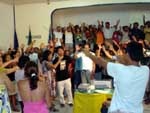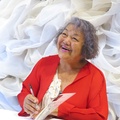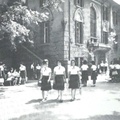>> 第5回
住民を〃環境の番人〃に
HANDSは今年七月、パラー州のトメ・アスー移住地からアグロ・フロレストリー(森林農業)の日本人専門家を当地に呼び、コミュニティを巡回するセミナーを実施した。地球環境基金(環境再生保全機構)からの助成を受けた。
一見、保健衛生とは関係ないように思えるが、「住民がコミュニティを離れてしまうと自然破壊が進むんです」と定森さんは真剣な表情で訴える。広大 な市ゆえに南部の方ではすでに不法な熱帯雨林の伐採が始まっており、コミュニティが消滅した場所から不法伐採が始まる傾向がある。
コミュニティが解体しないためには、経済的に安定することが重要だとHANDSは考えた。バナナ、マンジョッカだけに依存せず、多様性のある作物を自然の中で栽培する工夫の一貫としてこの取り組みが始まった。
「住民には〃森の番人〃として無謀な開発に目を光らせて欲しい」。定森さんは保健衛生知識の普及ではなく、環境保全にも目を配る必要があると強調する。
来年のプロジェクト終了を見越して、活動を引き継ぐ位置付けの団体IDEAS(アマゾン持続的開発協会)を立ち上げた。環境に力を入れた活動になることを見越した命名だ。
◎ ◎
実は人間的出産セミナーの直前、生まれたばかりだった定森さんの二人目の赤ん坊の容体が悪化し、定森さんは飛行機をチャーターして州都マナウスの病院に緊急移送していた。手術の可能性があり、顔には出さないが、心の中では心配で仕方なかったに違いない。
セミナーの途中で、元研修員の三人が音頭を取って、定森さんと関係が強い遠隔地コミュニティの地域保健員に前に出るように突然呼びかけると、会場の半分がごっそり移動した。
自ら参加を呼びかけていたとはいえ、遠隔地からこれほど駆けつけていたとは、実は定森さん自身も想定していなかった。最後に定森さんが真ん中に呼ばれ、全員が両手を上に上げ、真ん中にいる定森さんに向かって念を飛ばすような、祈るような仕草をした。
「子供の容体が良くなりますように」と全員で祈りが捧げられ、「アミーゴ・パラ・センプレ」(永遠の友達)が大合唱された。
不測の事態に、定森さんはこぼれる涙を手でぬぐいながら、言葉にならない様子で感謝した。自分が支援していたはずの人たちから逆に励まされる、そんな瞬間だった。
遠隔地の河民らは次々にマイクを持って「みんな貴方のことを愛している。子供が良くなることを心底祈っている」などと言葉を贈り、アブラッソ(抱擁)をした。
民衆からいかに頼りにされ、愛されているか、定森さんは実感したに違いない。
二十八時間かかる一番遠いコミュニティからきた長老格の教師オジネイア・メイレーレスさんは、セミナーの締めくくりにマイクを握り、「HANDS はいつも我々の側にたってものを考えてくれる。彼らが私たちに伝えてくれたことは本当に大切なことだ。心から感謝したい」と総括し、神に祈りを捧げた。
定森夫婦は懸命に介護したが二男は十一月二十日になくなった。河民たちの祈りも届かなかった。これもまた、定森さんが解決に尽力している遠隔地ゆえの貧弱な医療体制がもたらした悲劇の一つなのかもしれない。
◎ ◎
ブラジルはキレイ事で済む世界ではない。最初は好きで関わっても嫌な面もたくさん見ざるを得なくなる。格差社会ゆえの既得権者もいる。利害関係が複雑に絡み合う中で、社会の底辺から物事を変えようとする運動には風当たりも強い。
なぜそんなに伯国にこだわるのか。そんな問いかけに定森さんは、「正直言って今は嫌な部分の方が多いぐらい。でも、中途半端に辞めたくない。IDEASが動くのを見届ければ安心する」とつっぱる。相当な意地っ張りだ。
定森さんは「グローバリゼーションの世の中で日本だけ幸せになることはありえない。世界の困っている人に手を差し伸べる活動は今こそ重要です」と強調する。
さらに米英独仏などに比べ、「日本の国際貢献におけるNGO活動はまだ弱い。例えば国境無き医師団、MSHのような国際的な発言力のあるNGOは日本にはない」と語り、そのような団体を育てることの重要性を訴えた。
(終わり)
※ 本稿はニッケイ新聞2008年12月3日に掲載されたものを許可を持って転載しています。
※ ニッケイ新聞(www.nikkeyshimbun.com.br)はブラジル国サンパウロ州サンパウロ市で発行されている、移住者や日系人・駐在員向けの日本語新聞です。
© 2008 Nikkey Shimbun







